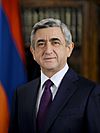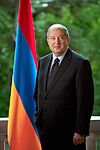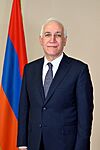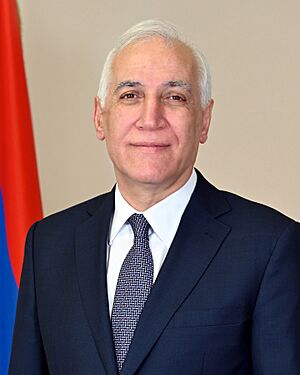President of Armenia facts for kids
Quick facts for kids President of theRepublic of Armenia |
|
|---|---|

Presidential standard
|
|

Presidential seal
|
|
| Style | Mr. President (formal) His Excellency (diplomatic, abroad) |
| Residence | Presidential Palace |
| Seat | Yerevan |
| Appointer | National Assembly |
| Term length | Seven years
non renewable
|
| Constituting instrument | Constitution of Armenia (1995) |
| Precursor | First Secretaries of the Communist Party of Armenia |
| Formation | 11 November 1991 |
| First holder | Levon Ter-Petrosyan |
| Deputy | President of the National Assembly |
| Salary | annual: AMD 15,873,600 |
The President of Armenia (Armenian: Հայաստանի Նախագահ, romanized: Hayastani Nakhagah) is the head of state for the country of Armenia. This person is chosen for a single seven-year term by the National Assembly of Armenia, which is like their parliament. In Armenia's government system, the president mostly has a symbolic role. Most of the real political power is held by the parliament and the Prime Minister.
Vahagn Khachaturyan has been the president since March 13, 2022.
Contents
What the President Does
The president's main job is to protect the Constitution. They also make sure that the government's different parts (like the executive, legislative, and judicial branches) work smoothly. The president is also responsible for Armenia's independence, land, and safety.
The president is usually protected from being sued or held responsible for actions they take while in office. However, they can be prosecuted for actions not related to their job after their term ends.
If the president's office is empty, the head of the National Assembly, or the prime minister, takes over until a new president is chosen.
How the Presidency Started
The role of president in Armenia was created on May 3, 1990. This happened when Armenia was still part of the Soviet Union.
Armenia became an independent country on September 21, 1991. This followed a vote where people chose independence. The first presidential election was held on October 17, 1991. Levon Ter-Petrosyan won and became the first president of independent Armenia.
He was re-elected in 1996 but resigned in 1998. After him, Robert Kocharyan served until 2008. Then, Serzh Sargsyan was president from 2008 to 2018. Armen Sarkissian took office in 2018. The current president, Vahagn Khachaturyan, started his term on March 13, 2022.
How the President is Chosen
The president is elected following rules set by the Constitution and other laws. Before 2015, citizens voted for the president for a five-year term. A person had to be at least 35 years old and an Armenian citizen for ten years to run. They could only serve two terms in a row.
After changes to the Constitution in 2015, the president is now elected by the National Assembly. This means the people do not vote directly for the president anymore.
Taking the Oath
When a new president starts their job, they take an oath. This is a special promise they make to the people. They swear to follow the Constitution and protect human rights. They also promise to ensure Armenia's independence and safety. This oath is usually taken during a special meeting of the National Assembly.
President's Powers and Duties
The president has several important powers given by the Constitution. They make sure the government's different parts work well together.
Working with the Government
The president represents Armenia in other countries. They guide foreign policy and sign international agreements. They also appoint and recall Armenia's ambassadors to other nations.
The president appoints the prime minister. This person is usually chosen based on which political party has the most support in the National Assembly. The president also appoints and dismisses other government members, like ministers, based on the prime minister's suggestions.
The president also forms and leads the National Security Council. This group helps make important decisions about the country's safety.
Laws and Decisions
The president signs laws passed by the National Assembly. If they disagree with a law, they can send it back to the National Assembly. They can ask them to discuss it again and suggest changes. If the National Assembly passes the law again, the president must sign it.
The president can also suggest changes to the Constitution. They can also dissolve the National Assembly and call for new elections in certain situations. For example, if the National Assembly fails to approve the government's plan twice.
Role in the Justice System
The president plays a role in appointing judges and members of the Constitutional Court. They also appoint members to other important legal bodies. The president can also grant pardons to people who have been convicted of crimes. They can also suggest that the National Assembly declare an amnesty, which means forgiving certain crimes for a group of people.
Military Role
The president is the Commander-in-Chief of Armenia's armed forces. This means they are the top leader of the military. They guide military policy and decide how the armed forces are structured.
If Armenia is attacked or faces a serious threat, the president can declare martial law. This is a special state where the military has more control. They can also call for mobilization, which means gathering soldiers for duty. During a war, the president can appoint or dismiss the commander of the armed forces.
The president also gives out military awards and honorary titles.
Ending a President's Term
A president's term can end if they resign, pass away, or are unable to do their job. They can also be removed from office through a process called impeachment.
Impeachment Process
A president can be impeached for serious crimes like treason. The National Assembly asks the Constitutional Court to investigate. If the court finds enough reasons, the National Assembly can vote to remove the president. This requires a two-thirds majority vote.
Health Issues
If a president becomes seriously ill and cannot perform their duties, the National Assembly can decide to remove them. This decision is made after getting a medical opinion from the Constitutional Court. It also requires a two-thirds vote from the National Assembly members.
President's Official Home
The official home of the President of Armenia is located at Baghramyan Avenue 26 in Yerevan. Since 2018, a special Honour Guard Company from the Ministry of Defense performs duties at the residence. The gates are often open for visitors on weekends.
Presidential Press Secretaries
Here are some of the people who have served as the president's press secretary:
- Ruben Shugaryan (1992–1993)
- Aram Abrahamyan (1993–1995)
- Levon Zurabyan (1995–1995)
- Kasia Abgaryan (1998–1999)
- Vahe Gabrielyan (1999–2003)
- Ashot Kocharyan (2003–2005)
- Viktor Soghomonyan (2005–2008)
- Samvel Farmanyan (2008–2010)
- Armen Arzumanyan (2010–2013)
- Arman Saghatelyan (2013–2015)
- Vladimir Hakobyan (since 2015)
List of Presidents
| No. | Name (Birth–Death) |
Portrait | Elected | Took office | Left office | Time in office | Office powers | Party |
|---|---|---|---|---|---|---|---|---|
| 1 | Levon Ter-Petrosyan (born 1946) |
 |
1991 | 11 November 1991 | 11 November 1996 | 6 years, 84 days | Head of Executive | Pan-Armenian National Movement |
| 1996 | 11 November 1996 | 3 February 1998 (Resigned) |
||||||
| 2 | Robert Kocharyan (born 1954) |
 |
— | 3 February 1998 | 9 April 1998 | 10 years, 66 days | Independent | |
| 1998 | 9 April 1998 | 9 April 2003 | ||||||
| 2003 | 9 April 2003 | 9 April 2008 | ||||||
| 3 | Serzh Sargsyan (born 1954) |
 |
2008 | 9 April 2008 | 9 April 2013 | 10 years | Republican Party | |
| 2013 | 9 April 2013 | 9 April 2018 | ||||||
| 4 | Armen Sarkissian (born 1952) |
 |
2018 | 9 April 2018 | 1 February 2022 (Resigned) |
3 years, 298 days | State representation, Guarantor of Constitution |
Independent |
| – | Alen Simonyan (born 1980) |
 |
— | 1 February 2022 | 13 March 2022 | 40 days | Civil Contract | |
| 5 | Vahagn Khachaturyan (born 1959) |
 |
2022 | 13 March 2022 | Incumbent | 3 years, 353 days | Independent |
Recent Election Results
The presidential election on March 2, 2018, was the first time the president was chosen by the National Assembly. This was due to new constitutional changes.
| Candidate | First round | |||
|---|---|---|---|---|
| Votes | % | |||
| Armen Sarkissian | 90 | 85.71 | ||
| Invalid/blank votes | 1 | 0.95 | ||
| Abstentions | 10 | 9.52 | ||
| Total | 101 | 96.19 | ||
| Eligible Voters | 105 | 100 | ||
| Source: Reuters | ||||
After Armen Sarkissian resigned in January 2022, the ruling Civil Contract Party suggested Vahagn Khachaturyan for president. He was elected by the Armenian parliament in a second round of voting. He officially started his term on March 13, 2022.
Timeline of Presidents

Presidential Awards
The president of Armenia gives out several awards to recognize achievements:
- RA Presidential Award
- RA Presidential Youth Award in Classical Music
- RA Presidential Youth Award
- RA Presidential Award for helping recognize the Armenian Genocide
- Global Award of the President of the Republic of Armenia for Outstanding Contribution to Humanity through IT (Global IT Award)
- Educational Awards of the President of the Republic of Armenia in Information Technologies
See Also
- Deputy Prime Minister of Armenia
- List of leaders of Armenia
- President of the National Assembly of Armenia
- Prime Minister of Armenia
- Vice President of Armenia
 | Dorothy Vaughan |
 | Charles Henry Turner |
 | Hildrus Poindexter |
 | Henry Cecil McBay |


